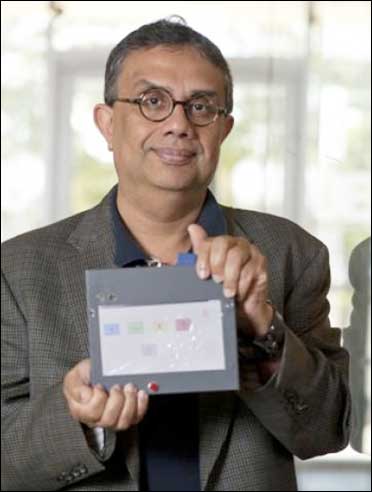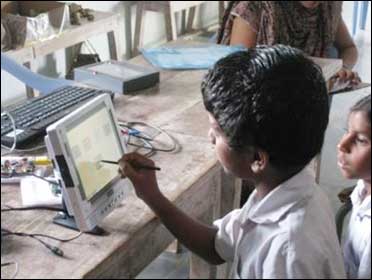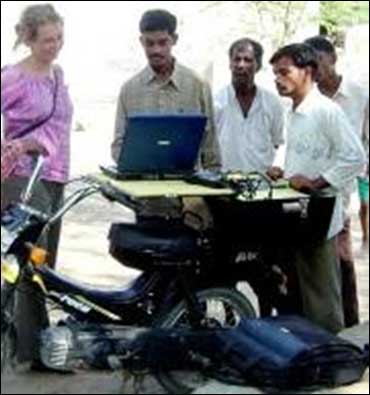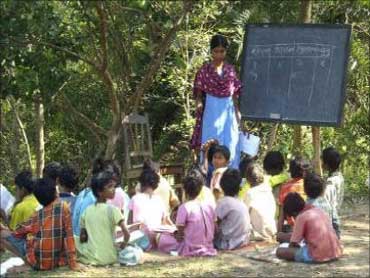How I-slate will help children in Indian villages
Last updated on: November 10, 2010 10:33 IST
Students in an Indian village have been selected to test a new low-cost electronic notepad being built around a new class of green, power-stingy microchips that use a fraction of the electricity of today's computer chips.
Dubbed as "I-slate", the device has been developed in partnership of Singapore's Nanyang Technological University (NTU), Houston's Rice University and Villages for Development and Learning Foundation (ViDAL), an NGO in India.
I-slate is targeted at millions of Indian school children who do not have access to electricity.
Click NEXT to read on...
How I-slate will help children in Indian villages
Last updated on: November 10, 2010 10:33 IST
"President Obama's visit to India this week highlights Indian economic achievements, but India's full economic potential will only be realised with sustainable, low-cost technologies that benefit all segments of the population," said Krishna Palem, a Rice University professor who is leading the effort to create a low-cost, electronic version of the hand-held slates that millions of Indian children use.
Palem's brainchild is in development at the Institute of Sustainable and Applied Infodynamics (ISAID) at NTU. The first prototypes of the I-slate, which were built at NTU this summer by a team that included three Rice undergraduates, are set to undergo their second round of tests in India later this month, the University said in a statement.
Click NEXT to read on...
How I-slate will help children in Indian villages
Last updated on: November 10, 2010 10:33 IST
Palem, who directs ISAID, said the I-slate is the first of a series of electronic notepads being built around a new class of green, power-stingy microchips that use a fraction of the electricity of today's computer chips.
Under development in partnership between ISAID and Switzerland's Center for Electronics and Microtechnology, the chips will make it possible for the I-slate to run on solar power from panels similar to those used in calculators.
Click NEXT to read on
How I-slate will help children in Indian villages
Last updated on: November 10, 2010 10:33 IST
The I-slate began to take shape over the summer, and early prototypes were introduced in tests at a school near Hyderabad in early August.
"Children in Indian village schools are just like their peers anywhere in the world: eager to learn, tech savvy and willing to try new pedagogical tools that engage their creative minds," ViDAL president Rajeswari Pingali said.
"The I-slate can help bring the marvels of ICT into thousands of rural schools and contribute to an improved learning experience."
Click NEXT to read on...
How I-slate will help children in Indian villages
Last updated on: November 10, 2010 10:33 IST
Based in Hyderabad, ViDAL is partnering with ISAID to test the first I-slates in Mohd Hussainpalli village, some 70 miles southwest of Hyderabad in a drought-prone area.
"There are many factors involved -- good nutrition, a good psychological environment, attentive teachers and appropriate learning and teaching tools.
"We can't control all of these, but ViDAL is active in areas where we can make a difference, like nutrition and teaching tools. We believe the I-slate has great potential once its design caters to local needs and strengths," Pingali added.





